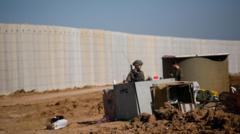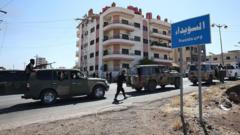As the 60-day ceasefire agreement deadline lapses, Israeli forces continue to occupy parts of southern Lebanon, citing incomplete compliance from the Lebanese Army and Hezbollah. This situation poses significant challenges for Lebanon’s new President Joseph Aoun amid rising concerns over potential new hostilities.
Ongoing Tensions in Lebanon as Israeli Withdrawal Deadline Passes

Ongoing Tensions in Lebanon as Israeli Withdrawal Deadline Passes
Despite the expiration of the deadline for Israeli withdrawal from southern Lebanon, troops remain, highlighting unresolved tensions in the region.
The deadline for the Israeli withdrawal from southern Lebanon expired early on Sunday, but Israeli troops are set to remain in certain areas, stating that a ceasefire agreement with Hezbollah has not yet been fully implemented. The agreement, which was negotiated by the US and France, aimed to cease the violent conflict that lasted over 14 months, facilitating the withdrawal of Israeli forces as well as the removal of Hezbollah fighters and their arms.
This period poses a substantial challenge for Lebanon’s newly elected president, Joseph Aoun, army chief, whose ambition is to foster stability within the nation. His office remarked on Saturday that intensive discussions were ongoing to tackle the situation in the south, highlighting the "dangerous Israeli practices" that are affecting the region's stability.
The conflict became increasingly severe last September, leading to an Israeli air campaign across Lebanon, the assassination of key Hezbollah figures, and a ground invasion in southern regions. The violent actions resulted in approximately 4,000 casualties, primarily among civilians, and displaced over 1.2 million individuals from their homes.
Details surrounding the ceasefire agreement indicate that Israel’s withdrawal depends on the Lebanese army's deployment in southern Lebanon and should enforce the agreement effectively while insisting that Hezbollah withdraw behind the Litani River, located approximately 30 kilometers from the Blue Line marking the unofficial border.
Despite the expiration of the deadline, the Israeli Prime Minister's office communicated that the process of withdrawing troops will persist in a gradual manner and in coordination with the United States, without clarifying how much longer the Israeli presence would linger in Lebanon. Moreover, the number of Israeli soldiers currently stationed in Lebanon remains uncertain.
In a recent statement from the Lebanese army, they confirmed progress in enhancing their deployment along the border, yet acknowledged delays attributed to Israeli reluctance in completely withdrawing, thus complicating their operations. They advised local residents against returning to border areas for safety.
Following the missed deadline, Hezbollah has refrained from issuing immediate responses. A prior statement condemned potential Israeli inaction as a blatant breach of the agreement and an infringement on Lebanon's sovereignty, without detailing how it would react should Israeli troops remain.
A knowledgeable Western diplomatic source reported that Israel requested additional time to dismantle Hezbollah’s remaining infrastructure in southern Lebanon. Initially, there were intentions for a 30-day extension.
Hezbollah's cautious stance reflects its precarious position; having seen its military capabilities severely diminished despite maintaining strong support among Lebanon's Shiite community. The ceasefire deal has been viewed by critics as a capitulation for the group, which suffered considerable losses, including key executives and a significant portion of its military resources.
While violations of the truce have occurred, it ultimately succeeded in halting the violence that wreaked havoc on Lebanon’s infrastructure, allowing many displaced residents to cautiously return home. Should Hezbollah decide to escalate attacks, it likely would confront strong resistance both from critics within Lebanon and potentially from segments of its own support base, who view the group’s involvement in broader conflicts unfavorably.
Lebanon’s new leader, Joseph Aoun, is committed to enacting a series of sweeping reforms aimed at rebuilding a state long plagued by corruption, revamping the devastated economy, and curtailing groups like Hezbollah’s monopoly on arms. However, the army's ability and willingness to confront the group is in doubt, as any moves against Hezbollah could trigger internal conflict.
Israel’s overarching objective was to enable the return of around 60,000 previously displaced residents to northern communities and to mitigate Hezbollah's presence near the border. While Hezbollah launched a military campaign to express solidarity with Palestinians in Gaza post-Hamas attacks on October 7, 2023, lingering tensions continue to cast uncertainty over the region’s stability.


















